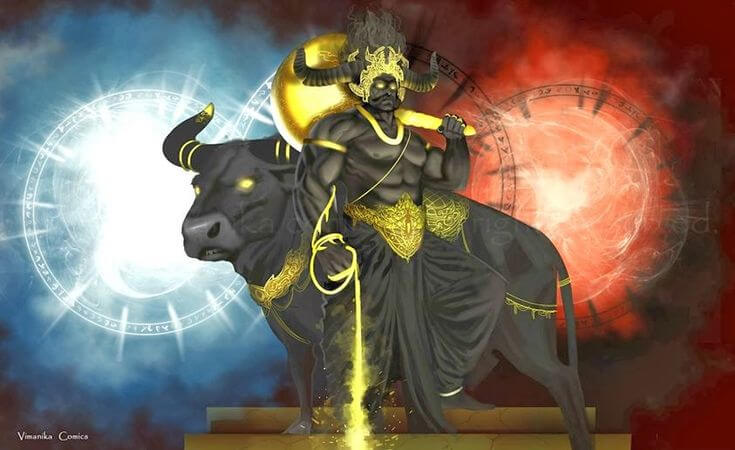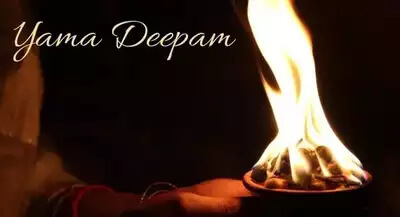Yama Deepam, also known as Yama Deepam or Yama Divas, is a significant but lesser-known ritual in Hindu tradition, observed in different regions of India during Diwali, the Festival of Lights. The day is dedicated to Lord Yama, the god of death and justice, and it is believed that lighting a lamp in his honor on this day can protect against untimely death and provide peace to the departed souls of ancestors. The name “Yama Deepam” comes from the words "Yama," referring to the Lord of Death, and "Deepam," meaning lamp or light.

Spiritual Significance of Yama Deepam
Yama Deepam is typically observed on the second day of Diwali, which is also known as Naraka Chaturdashi. According to Hindu mythology, this day marks Lord Krishna's victory over the demon Narakasura, symbolizing the triumph of good over evil and light over darkness.
In a broader sense, Yama Deepam reflects the deep spiritual principle of life and death. In Vedic philosophy, death is not an end but a transition from one state of existence to another. Yama, the god of death, is regarded as a divine being who guides souls to the afterlife. Honoring him with the light of a deepam is symbolic of seeking his protection and blessings to overcome the fears associated with mortality, while simultaneously honoring the deceased ancestors who have passed from this life.

Rituals and Observances
The central aspect of Yama Deepam is the lighting of an oil lamp outside the home, specifically facing the southern direction. This direction is traditionally associated with Yama and the departed ancestors, and placing a light here is believed to ward off negative influences and ensure protection for the family. The lamp is usually lit in the evening, and families offer prayers to Yama, seeking his blessings for longevity, safety, and peace.
Here’s how Yama Deepam is traditionally observed:
- Cleaning and Preparing the Home: On this day, families clean their homes as part of the larger Diwali preparation. The cleanliness is seen as a way of inviting positive energies and driving away inauspiciousness.
- Lighting the Deepam: A small oil lamp is prepared, usually with ghee or sesame oil, and a cotton wick is used. This lamp is lit in the evening and placed outside the home, facing the southern direction.
- Prayers to Yama: Devotees recite special prayers and mantras dedicated to Lord Yama. This includes the Yama Gayatri Mantra, which is chanted to invoke protection and remove the fear of death.
- Offerings: In some regions, offerings such as flowers, sweets, and water are made in honor of Yama. Some families also perform rituals for their ancestors (Pitru) to ensure their peace in the afterlife.
- Offering Food: Another important aspect is offering food to crows, which are regarded as the messengers of Yama. Feeding crows is believed to bring blessings from ancestors and ensure their well-being in the spiritual realm.
Yama Deepam and the Lessons of Life and Death
While Diwali is often celebrated with joy and festivities, Yama Deepam is a reminder of the deeper truths that the festival symbolizes—life’s impermanence, the cycle of birth and death, and the importance of living a righteous life. By honoring Lord Yama, we acknowledge the natural order of the universe and seek divine protection from unforeseen calamities.
In modern times, Yama Deepam can serve as a reflective practice for contemplating the meaning of death and the importance of living with integrity. Lighting the deepam becomes a gesture of dispelling the darkness of ignorance, fear, and uncertainty about death, bringing the light of wisdom and spiritual clarity.
Conclusion
Yama Deepam is a beautiful and profound tradition within the Diwali celebrations. It serves as a reminder that light not only symbolizes joy and prosperity but also represents protection, wisdom, and spiritual continuity. By honoring Yama, the Lord of Death, with the lighting of a lamp, we invoke his blessings for peace, protection, and a reminder of the cyclical nature of existence.
Observing Yama Deepam helps align us with the ancient wisdom of respecting life and death as part of the divine order and seeking the grace that helps us navigate both with courage and grace.


0 Comments